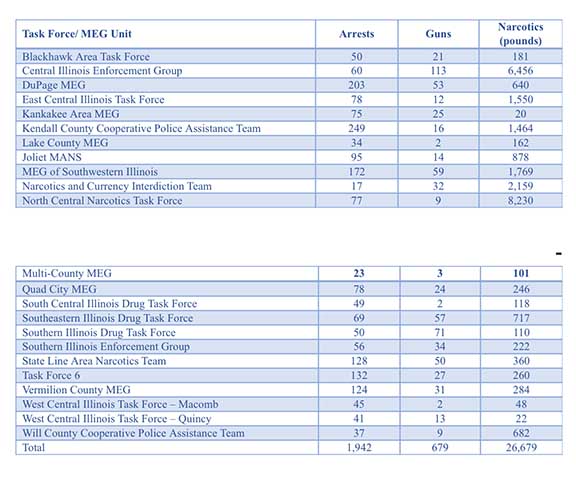SPRINGFIELD – The Illinois State Police (ISP), working with local law enforcement and community partners, continues to decrease the supply of opioids and other drugs devastating many neighborhoods. In 2022, the ISP Metropolitan Enforcement Groups (MEGs) and Drug Task Forces across the state seized 679 firearms, 26,679 pounds of drugs, and arrested 1,942 individuals. The ISP MEGs and Drug Task Forces are on the front lines of narcotic enforcement, prevention, and treatment strategies. MEGs and Task Forces represent a collaborative effort among state, federal, and local law enforcement agencies to enforce Illinois drug laws and investigate gang activity.
“Every neighborhood deserves to be free from violence,” said Governor JB Pritzker. “We’re getting results through an evidence-based and data driven approach focusing on violence prevention. I’m thankful for the hard work of our dedicated law enforcement officials who risk their lives in order to build safer communities across the state.”
“ISP is building stronger and safer communities by focusing on apprehending violent, drug-trafficking criminals who leave a wake of devastation,” said ISP Director Brendan F. Kelly. “We are doing so by building relationships with the community.”
The nine MEGs and 13 Drug Task Forces across Illinois work with the Statewide Terrorism Intelligence Center and Illinois National Guard Counterdrug Analysts, as well as the U.S. Drug Enforcement Administration, the Federal Bureau of Investigation, the U.S. Marshals Service, and other agencies to reduce crime through intelligence led policing, which focuses enforcement efforts on felony-level drug distribution and trafficking.
Task Force and MEG arrests, and gun and narcotics (in pounds) seizures in 2022.

ISP has partnered with the Treatment Alternatives for Safe Communities (TASC) and worked through the East St. Louis Public Safety Enforcement Group (PSEG), the Southern Illinois Drug Task Force (SIDTF), the Southern Illinois Enforcement Group (SIEG), the Metropolitan Enforcement Group of Southwestern Illinois (MEGSI), and the South Central Illinois Drug Task Force (SCIDTF) to implement the Deflection and Pre-Arrest Diversion (DPAD) Initiative. The initiative is aimed at preventing repeat negative encounters with law enforcement and the justice system and helping get individuals needed drug treatment. The ISP MEGs and Drug Task Forces partner with other community groups, health organizations, and local stakeholders to address and prevent substance abuse disorders affecting communities throughout Illinois.
In 2022, MEG and Drug Task Force agents partnered with and/or provided prevention and education seminars to various community groups, schools, health facilities, and treatment organizations, including:
- Citizens Police Academy
- Saint Eugene’s Elementary Catholic School
- DuPage County NARCAN Program
- Behavioral Health Alliance of Will and Grundy County
- Grundy County Area Vocational Center
- DuPage County Prevention Leadership Team
- DuPage County Heroin and Opioid Prevention and Education (HOPE) Task Force
- DuPage County Chiefs of Police Association
- DuPage County Senior Police Management Association
- Drug Enforcement Administration
- Kankakee Area Pledge for Life Partnership
- Riverside Medical Center
- State Representative Jackie Haas
- Kankakee County Opioid Task Force
- Boy Scouts of America
- Chestnut Health and Treatment Center
- Rock Island County Probation
- Eastern Iowa Family Services
- Quad Cities Citizen’s Police Academy
- Rock Island Council of Addictions
- Massac County Drug Awareness Coalition (MCDAC)
- Truth and Consequence Program at Massac County Jr. High School
The nine MEGs cover 20 counties and are overseen by a policy board composed of ISP officers, elected officials, and chief law enforcement officers or their designees. The 13 Drug Task Forces cover 50 counties. A map of the MEG and Task Force coverage area can be found on the ISP website at https://isp.illinois.gov/DrugEnforcement/DrugEnforcementMap.
